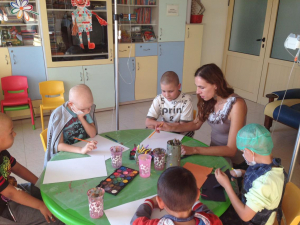
ARTON PROGRAM - The therapeutic power of the group
Creative projects involving group work - general musical performance or group painting, collage, sculpture - are useful in helping to explore and strengthen social...

When one child in a family is struggling with emotional or behavioral issues, it affects the whole family. For parents, taking care of the child in distress can become all consuming, and it can be difficult to make sure siblings are getting what they need, too.
A child who isn’t the one with special needs, who seems to be doing fine—or may be acting as if he’s doing fine—may in fact be struggling, too.
Here are some ways siblings might be affected, and things you can to do help them respond to the challenge in a healthy way.
Other children in the family are affected most when a psychiatric or developmental disorder results in frequent outbursts—dramatic meltdowns or rages, or aggression towards other family members.
It’s natural to be upset when another child is yelling or having a tantrum—these things are upsetting for parents, too, notes Mandi Silverman, a clinical psychologist at the Child Mind Institute. A child might be in tears while it’s happening, but most kids bounce back and are able to take them in stride, especially if they understand that their brother or sister has an illness that makes it hard for them to control their emotions and their behavior.
“But siblings can also feel very overwhelmed by the behavior,” said Dr. Silverman, “especially if it includes verbal abuse or physical aggression, and it is inflicted on them. Sometimes they can even feel unsafe.”
Chronic feelings of anger, frustration, or anxiety can be serious for the siblings, said Jill Emanuele, a clinical psychologist at the Child Mind Institute. “Those children are at risk for other mental illnesses like depression or trauma, especially if there is aggression or violence going on.”

Children in a family that’s under stress because of mental illness need a support system to turn to when they’re feeling overwhelmed. This can be in the form of regular check-ins with a family member or friend the child feels comfortable confiding in. Or it could be a weekly appointment with a therapist. It can take a while for a child to develop a close relationship with this ally, but the key is to have a structure in place that the child can turn to when she has questions, issues or concerns.
When Laura Kleinhandler’s middle child developed severe OCD, her older sister got very withdrawn and her grades started slipping. So Kleinhandler decided to move her into a private school, something she calls the best decision the family made. “It was a much more nurturing environment,” she said. “She developed relationships with her teachers and friends, and she became much more able to share her life experiences.”
It’s also common, said Dr. Emanuele, for the other siblings to mimic the negative behaviors of their brother or sister, especially if they’re younger and don’t understand where the behavior is coming from.
Mother-of-five Michaela Searfoorce reports that her third child, a four-and-a-half year old boy, is prone to intense temper tantrums when things aren’t exactly right. If all the cups aren’t the same color at dinner, or he misses even a tiny bit of a bedtime story, he may have a screaming meltdown.
He is in the process of being diagnosed, but these meltdowns disrupt the entire family. They prohibit the other children from playing peacefully or watching a movie, or concentrating on their homework, and they consume a lot of parental attention.
Searfoorce is concerned that the younger siblings, at six months and two years, are starting to mimic the behavior of their older brother, yelling wildly to be heard. But what upsets her the most is that her children perceive this behavior as normal. “It bothers me that they are used to the screaming,” she said.
Dr. Emanuele recommends being alert for copycat behavior and putting a routine in place where the kids are given praise and attention for other positive behaviors, to counteract what is being learned by example.
It can also help to give kids some distance by engaging them in activities outside the family. “It’s okay for kids to take a break,” Dr. Silverman said.
Searfoorce, says she tries to initiate times when her daughter can play with other kids and not have to worry about her challenging brother. “The way we give her a break is she goes to gymnastics and ballet and tap and swim team, so she gets time with other children and she gets time out of the house on her own,” she said.
Searfoorce also notes that her daughter is friendly with everyone. “She is the most social person!” she says. “I feel like that is because she has had to learn with some difficult personalities in our family. She totally rolls with it.”
Another thing siblings wrestle with is worry about the child who is having a hard time. Kleinhandler remembers the looks on her two other daughters’ faces when they learned their sister with OCD was going to a residential treatment facility across the country. “It was beyond devastating,” she said. “All they pictured was a mental hospital, and it was terrifying.”
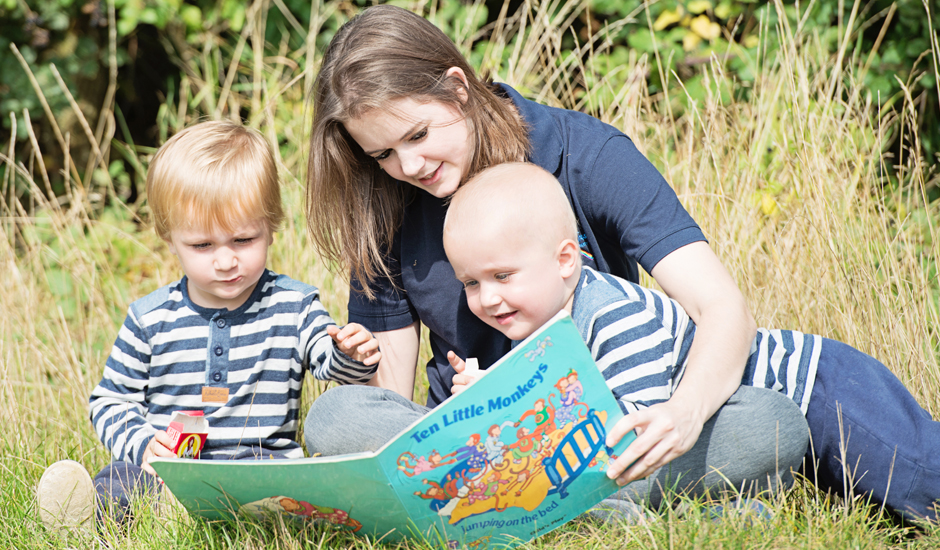
Sometimes the healthy children turn their anxieties on themselves and self-diagnose. “Kids will start to come up with symptoms they don’t have or start to behave in ways that aren’t typical of them,” said Dr. Emanuele. “They might say, ‘I can’t pay attention, I must have ADHD.'”
Liza Long, a mother of four children, including a son with bipolar disorder, says her daughter gets scared she also has it when she gets angry or frustrated. “I tell her, ‘It’s normal to feel frustrated, but let’s talk to your therapist about that.'”
Long also worries about so much of the family’s resources going toward treatment and care for one child. Her oldest son is 18 and was accepted into great colleges the family can’t afford. “It’s hard for me to look at where he’s gotten in and say, ‘That’s not going to happen.'”
Sometimes one child’s problems require the other kids in the family to act older than their age. They may become their parents’ helpers in caring for the child with issues. Or just feel that they have to be perfect, since their parents have so much to handle.
Long’s son, until he was diagnosed and treated for bipolar disorder, fell into violent rages that even involved pulling a knife on members of his own family. All the siblings were trained to go to a safe spot like a car and lock the door until the episode had passed. This was especially hard on her oldest son, she said. “He had to grow up a lot faster than he would have otherwise. He had to be more responsible, to be the one to make sure the youngest ones were safe—or the one to call the police.”
Parents should start being concerned if they see their child’s behavior change drastically. If a child who regularly sleeps through the night starts waking up repeatedly, if there is a sudden shift in appetite, if a child who loves playing Minecraft loses interest in it suddenly, if a talkative child shuts down, if a child’s grades go down—these are all reasons for pause.
Because the siblings of children with mental illnesses are already vulnerable, parents should be aware of the signs that something may be wrong, said Dr. Emanuele.
Effective ways of being proactive include checking in with school to see how the child is doing, and asking the teacher and guidance counselors to look out for changing behaviors. Parents should also be in an open dialogue with their kids, especially ones who may feel guilty talking about their own needs..
Perhaps the most important things a parent can do, said Dr. Silverman, is follow your gut. “Keep your eyes and ears open, and if you feel that something is particularly worrisome, it may be important to consult with a mental health professional for additional screening and support.”
Most importantly, parents need to take care of themselves. This means making time for basic necessities: exercise, sleep, food, and downtime. “If you get to the point where you can’t take care of yourself because the child is taking up that much time and energy, they may need more care than outpatient treatment is giving,” said Dr. Emanuele.
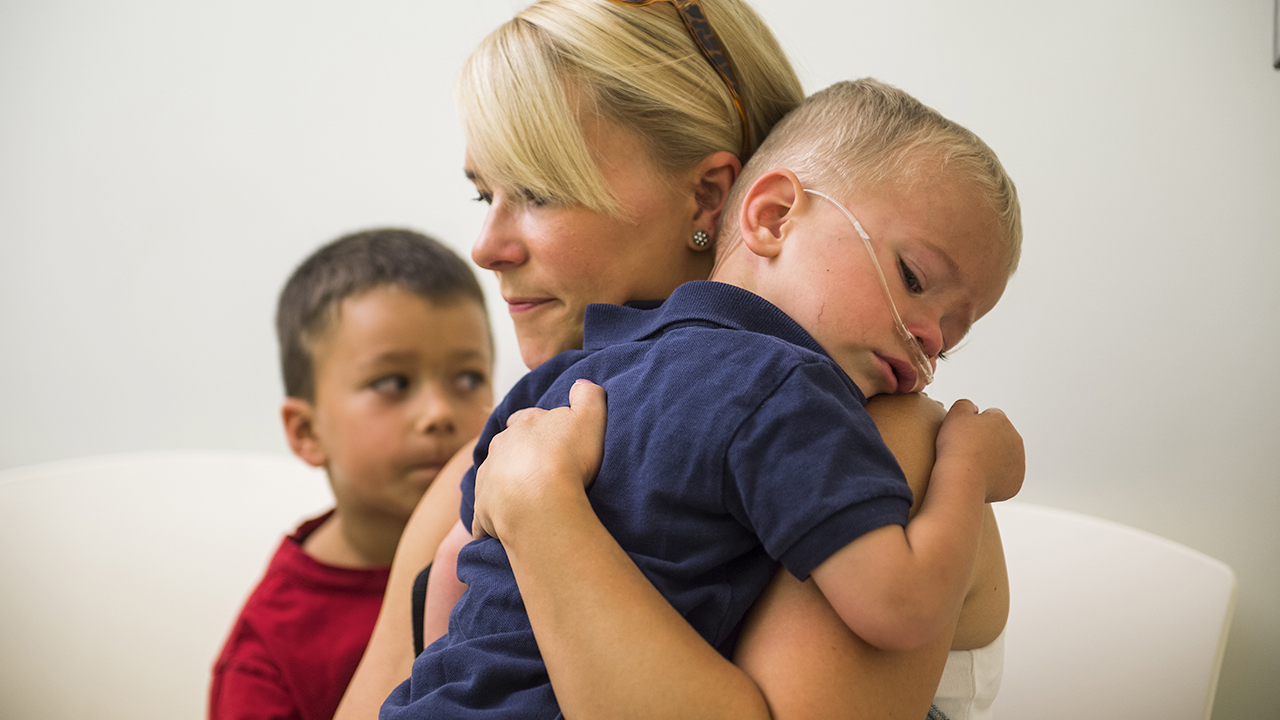
Parents also suffer because they get so worried about their children or so stressed that they aren’t doing the right thing, the anxiety consumes them. That can be alleviated by focusing on the present, she says. “If you find yourself thinking those thoughts, try to turn them to, what can I do now? Can I make my daughter’s favorite food and make her feel better? Can I watch a movie with my children and relax with them right now?”
Long says the best thing she has done for herself is put herself in therapy alongside her children. “I do therapy, I’ve done parenting classes. I’m in support networks,” she says. “Facebook also plays a great role for parents of kids with mental illness.” The bottom line: take care of yourself so you can do the best job you can as a parent.
Article re-posted from https://childmind.org/

Creative projects involving group work - general musical performance or group painting, collage, sculpture - are useful in helping to explore and strengthen social...
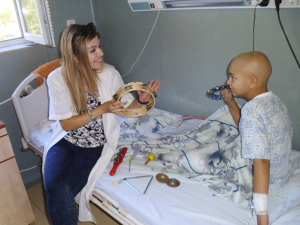
In the ARTON Program our team of oncopsychologists, art therapists and music therapists develops the process of children's creativity as a process of...
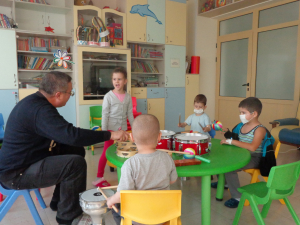
In ARTON sessions, creating a piece of music or a song is an emotional experience of coping and satisfaction for the participating children. They make friends with...
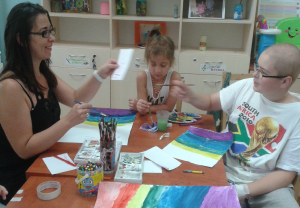
Painting provides patients with a spontaneous, plastic method of depicting thoughts and experiences. Painting with paints is not as structured as with pencil or...










